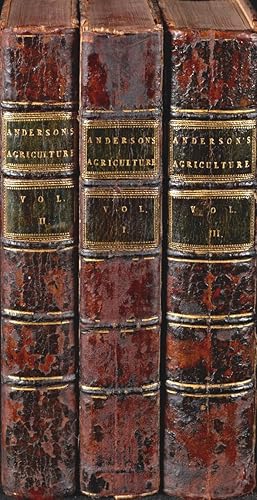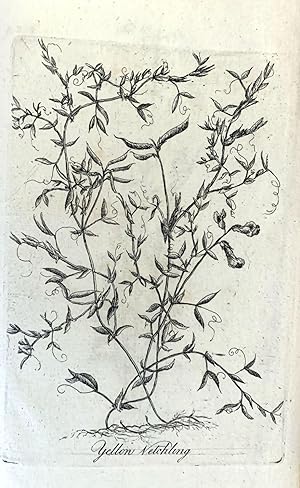Descripción
Volume I contains half-title, 1 page publisher's advertisement, separate title for Essay VI, and 3 folding engraved plates; Volume II contains 2 title pages, advertisement from publisher (explaining why there are 2 title pages), separate half-title to Essay VI, and 18 engraved plates; Volume III is complete with the half-title and errata. Contemporary calf, worn; interiors excellent. From the library of Robert H. Elliot, with his bookplates. First three editions, including the very scarce second volume which includes the "Additions" to the six essays contained in the first printing of 1775 as well as the second part, plus the additional essays making up Volume III, written "at the request of the President of the Board of Agriculture." The essays which make up the first volume include treatment of enclosures and fencing, draining bogs and swampy ground, on leveling ridges, on the proper method of sowing grass seeds, on hay-making, and a lengthy entitled "Miscellaneous disquisitions, doubts and queries relating to agriculture." This essay was supplemented in the 1777 printing by a treatise on quick-lime. The third volume contains three essays, the first "On the obstacles to the advancement of agriculture in England, and the means of removing them;" the second "On waste lands, and the means of their improvement;" and the third "Hints on the economical consumption of the produce of a farm." The lovely engraved illustrations in Volume II identify a number of different grasses. As one might tell from the titles and from reading just a bit of the essays, the author was a practical man whose writings are clearly the results of his experience. Anderson (1739-1808) published a number of essays on agriculture, though was best known for his work on corn laws. He was quite familiar with newer technology, and indeed invented a number of agricultural improvements, most famously the "Scotch plough" for use on heavy soils. Most of his publications appeared in contemporary journals, where he detailed what he termed works "calculated to desseminate useful knowledge among all ranks of people at a small expense. Anderson was born near Edinburgh, where he took over a family farm at age 15. According to Fussell: "Anderson was in the most precise sense a miscellaneous writer . . . much of his contribution was severely practi al as might be expected from a man of his experience . . . He turned to the farmer asnd saw him isolated and ill informed, so he decided to publish 'a concise view of all those subjects that ought to demand the farmer's attention'. His work is doubtfully concise, but is certainly comprehensive." DNB, I, p. 381; Fussell, More Old English Farming Books, pp. 104-06; Goldsmith, I, 11233; McDonald, Agricultural Writers, 1200-1800, pp. 214-15. N° de ref. del artículo 10874
Contactar al vendedor
Denunciar este artículo
![]()


